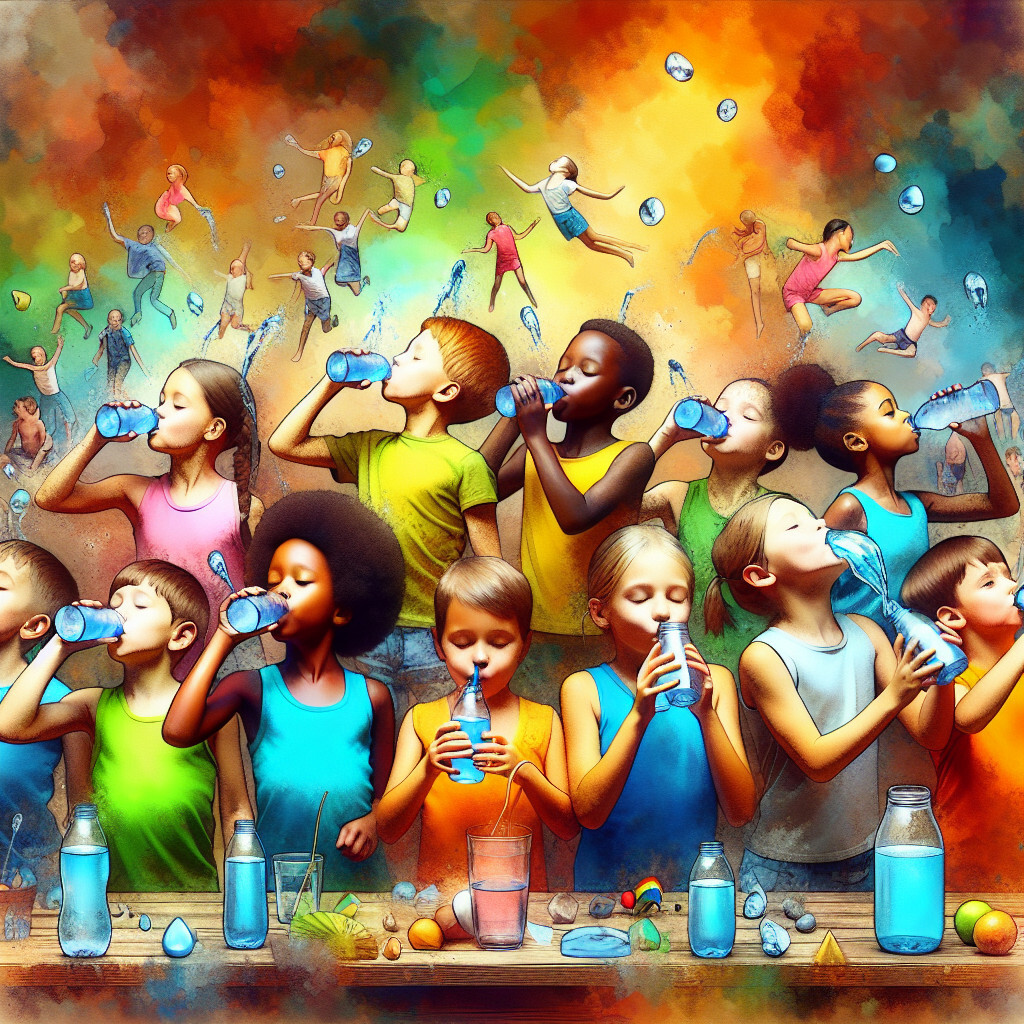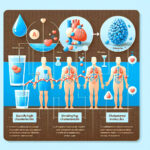-
Table of Contents
“Hydrate to Elevate: Empowering Children’s Health and Growth with Water!”
Introduction

Drinking water is essential for children’s health and development. It aids in maintaining hydration, promoting good digestion, enhancing nutrient absorption, and ensuring proper brain function. It also helps in flushing out toxins from the body, regulating body temperature, and promoting healthy skin. Moreover, drinking water can improve concentration and cognitive function in children, supporting their academic performance. Therefore, encouraging children to drink water regularly can significantly contribute to their overall well-being and growth.
Understanding the Importance of Hydration for Children’s Health
Water, often overlooked, is a fundamental component of our daily lives. It is especially crucial for children, playing a significant role in their overall health and development. Understanding the importance of hydration for children’s health is essential for parents, caregivers, and educators alike.
Water makes up about 60% of our body weight and is involved in numerous bodily functions, including digestion, absorption, circulation, creation of saliva, transportation of nutrients, and maintenance of body temperature. For children, who are typically more active and energetic than adults, staying hydrated is even more critical.
One of the primary benefits of drinking water for children is its role in cognitive function. Dehydration can impair a child’s concentration, alertness, and short-term memory. In contrast, proper hydration can enhance their cognitive performance, improving their attention span and reasoning skills. This can significantly impact their academic performance and overall learning experience.
Moreover, water is essential for a child’s physical health. It aids in digestion and prevents constipation, a common problem among children. Drinking enough water also helps maintain a healthy weight as it can suppress appetite and increase feelings of fullness. Additionally, water helps to flush out toxins from the body, promoting good kidney health and reducing the risk of urinary tract infections.
Furthermore, staying hydrated is crucial for children’s oral health. Drinking water, especially if it’s fluoridated, can help prevent tooth decay. Water helps wash away food particles and acids produced by bacteria in the mouth, thereby protecting the teeth and gums.
Hydration also plays a vital role in the regulation of body temperature. Children, particularly those involved in sports and other physical activities, can lose a significant amount of fluid through sweat. If these fluids are not replaced, it can lead to heat exhaustion or heat stroke. Drinking water helps replenish these lost fluids, ensuring that the body can cool itself effectively.
Despite the numerous benefits of drinking water, many children do not consume enough of it. This can be due to a preference for sweetened beverages, lack of access to clean water, or simply not feeling thirsty. It is important for parents and caregivers to encourage regular water intake and make clean, safe drinking water readily available.
Incorporating fun, child-friendly strategies can also help increase water consumption. This could include using colorful water bottles, adding slices of fruits for flavor, or setting hydration goals. Educating children about the importance of drinking water and its impact on their health and well-being can also motivate them to stay hydrated.
In conclusion, water is a vital nutrient that plays a significant role in children’s health and development. It aids in cognitive function, supports physical health, promotes oral health, and regulates body temperature. Ensuring that children stay adequately hydrated can help them maintain good health, perform better acadically, and lead a more active lifestyle. Therefore, understanding the importance of hydration for children’s health is not just beneficial, but essential.
How Drinking Water Boosts Cognitive Development in Children
Water, often referred to as the elixir of life, plays a crucial role in the overall health and well-being of individuals, especially children. It is a well-known fact that staying hydrated is essential for maintaining physical health. However, the impact of water on cognitive development in children is an aspect that is often overlooked.
Cognitive development refers to the growth and progression of the brain’s ability to process information, reason, remember, and solve problems. It is a critical aspect of a child’s growth, influencing their learning and understanding capabilities. Research has shown that adequate water consumption can significantly boost cognitive development in children.
Firstly, water is a primary component of the human brain, constituting about 75% of its total weight. Therefore, it is logical to infer that adequate hydration is necessary for the brain to function optimally. Dehydration, even mild, can impair a range of cognitive functions in children, including attention, memory, and motor skills. It can also lead to mood fluctuations and reduced alertness, which can further hinder a child’s learning and problem-solving abilities.
Secondly, drinking water aids in the transportation of nutrients and oxygen to the brain. The brain, despite representing only 2% of the body’s weight, consumes approximately 20% of the body’s energy. To function efficiently, it requires a constant supply of nutrients and oxygen, which water helps deliver. By facilitating the delivery of these essential elements, water plays a pivotal role in maintaining the brain’s energy levels, thereby enhancing cognitive performance.
Moreover, water helps in the removal of waste products from the brain. The brain’s metabolic activities generate waste products that can be harmful if not efficiently eliminated. Water aids in flushing out these waste products, thereby preventing their accumulation and potential detrimental effects on cognitive functions.
Furthermore, studies have shown that drinking water can improve children’s attention and memory. A study conducted by the University of East London found that children who drank additional water performed better on visual attention tasks. Another study published in the journal “Appetite” revealed that children who drank more water had improved short-term memory.
In addition to these cognitive benefits, drinking water also has a positive impact on children’s physical health. It aids in digestion, maintains body temperature, and promotes healthy skin. It also helps in the prevention of health issues such as constipation, urinary tract infections, and kidney stones.
However, despite the numerous benefits of drinking water, many children do not consume enough of it. Parents and caregivers should encourage children to drink water regularly. They can do this by making water readily available, offering it at every meal, and setting a good example by drinking water themselves. Schools can also play a part by providing water fountains and promoting the importance of hydration.
In conclusion, drinking water is not just about quenching thirst or maintaining physical health. It plays a significant role in boosting cognitive development in children. By ensuring that children stay adequately hydrated, we can help them achieve their full cognitive potential, thereby setting a strong foundation for their future learning and development.
The Role of Water in Promoting Healthy Digestion in Children
Water, the most abundant and essential compound on Earth, plays a pivotal role in promoting healthy digestion in children. It is a fundamental component of our bodies, constituting about 60% of our body weight. In children, this percentage is even higher, making water an indispensable part of their diet. This article aims to shed light on the benefits of drinking water for children, particularly its role in promoting healthy digestion.
The digestive system is a complex network of organs that work together to break down food, absorb nutrients, and eliminate waste. Water is a crucial player in this process. It aids in the breakdown of food, ensuring that the body can absorb the nutrients effectively. Without adequate water, the process of digestion can become slow and inefficient, leading to various digestive problems such as constipation and bloating.
Constipation is a common problem in children, often caused by a lack of sufficient water intake. Water helps soften the stool, making it easier to pass. When a child does not drink enough water, their body compensates by drawing water from the stool to meet its needs, resulting in hard and dry stools that are difficult to pass. By ensuring that children drink enough water, parents can help prevent constipation and promote regular bowel movements.
Moreover, water is essential for the production of digestive juices. These juices, produced by the stomach and the pancreas, play a crucial role in breaking down food into smaller, absorbable particles. Without enough water, the production of these juices can be hindered, affecting the body’s ability to digest food properly.
In addition to aiding digestion, water also plays a vital role in nutrient absorption. Once the food is broken down into smaller particles, the nutrients need to be absorbed into the bloodstream. Water facilitates this process, helping transport the nutrients to different parts of the body where they are needed. Without sufficient water, the absorption of nutrients can be compromised, leading to nutrient deficiencies.
Furthermore, water helps flush out toxins from the body. During the process of digestion, the body produces waste products that need to be eliminated. Water aids in this process, carrying the waste products to the kidneys, where they are filtered out and excreted in the urine. By drinking enough water, children can help their bodies get rid of these waste products, promoting overall health and well-being.
In conclusion, water plays a crucial role in promoting healthy digestion in children. It aids in the breakdown of food, softens the stool, facilitates the production of digestive juices, helps in nutrient absorption, and assists in waste elimination. Therefore, it is essential for parents to ensure that their children drink enough water daily. Not only will this promote healthy digestion, but it will also contribute to their overall health and well-being. Remember, a well-hydrated child is a healthy child.
Water Consumption and Its Impact on Children’s Physical Performance
Water is a fundamental element of life, and its consumption is crucial for the overall health and well-being of individuals, particularly children. The benefits of drinking water for children are manifold, impacting not only their physical performance but also their cognitive development and overall health.
Children, due to their active lifestyle and rapid growth, have a higher water requirement compared to adults. Water aids in the digestion of food, absorption of nutrients, and the elimination of waste from their bodies. It also plays a vital role in maintaining their body temperature, especially during physical activities. Dehydration, even mild, can lead to fatigue, reduced coordination, and less tolerance for exercise. Therefore, regular water intake is essential to ensure that children can perform physical activities optimally and maintain their energy levels.
Moreover, water is a critical component of blood, which carries oxygen and nutrients to all parts of the body, including the brain. Adequate hydration is thus necessary for optimal brain function. Research has shown that even mild dehydration can affect a child’s concentration, alertness, short-term memory, and other cognitive functions. Therefore, drinking water regularly can help children stay focused and perform better acadically.
In addition to its role in physical performance and cognitive function, water consumption has several other health benefits for children. It aids in the proper functioning of the kidneys, helping to filter waste products from the blood and excrete them in urine. This process helps prevent urinary tract infections and kidney stones, which are increasingly common in children.
Furthermore, drinking water can help maintain healthy skin. Skin is the body’s largest organ, and like any other part of the body, it is made up of cells. And skin cells, like any other cells in the body, are made up of water. Without adequate water intake, skin can become dry, tight, and flaky. Dry skin is less resilient and more prone to wrinkling. Therefore, regular water intake can help keep a child’s skin healthy and hydrated.
Drinking water also plays a role in maintaining a healthy weight. It can help control calories as it has zero calories and can make one feel full, thereby reducing the intake of high-calorie foods and drinks. This can help prevent obesity, a growing concern in children today.
In conclusion, the benefits of drinking water for children are extensive and multifaceted. It is essential for their physical performance, cognitive function, and overall health. Parents and caregivers should therefore encourage children to drink water regularly. This can be done by making water readily available, providing them with their own water bottle, and setting a good example by drinking water themselves. It is also important to note that while water is crucial, it should be consumed in appropriate amounts. Too much water can lead to water intoxication, a serious condition that can be life-threatening. Therefore, it is important to strike a balance and ensure that children are consuming an appropriate amount of water.
Q&A
1. Question: What are the benefits of drinking water for children’s physical health?
Answer: Drinking water helps maintain hydration, aids in digestion, helps in nutrient absorption, and regulates body temperature. It also helps in maintaining healthy skin and promotes good oral health.
2. Question: How does drinking water affect children’s cognitive function?
Answer: Proper hydration is essential for children’s brain health. It can improve their concentration, memory, and overall cognitive function.
3. Question: Can drinking water help children maintain a healthy weight?
Answer: Yes, drinking water can help children maintain a healthy weight as it helps to control appetite and prevent overeating. It also helps to boost metabolism.
4. Question: How does drinking water contribute to children’s overall well-being?
Answer: Drinking water helps to flush out toxins from the body, boosts the immune system, and contributes to better sleep and mood. It also aids in overall growth and development.
Conclusion
In conclusion, drinking water provides numerous benefits for children including maintaining hydration, aiding digestion, improving cognitive function, supporting physical performance, and promoting overall health and well-being. It also helps in the proper functioning of bodily processes and in the prevention of illnesses.






